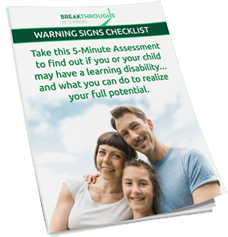
Does it affect life at home, at school or at work?
Take 5 minutes to complete the Warning Signs Checklist and discover whether you or your child could have learning difficulties that are impacting your life, and what to do about it.
Take The Free Warning Signs Checklist!
Learning disability myths arise from many assumptions about children and their environments, including the quality of parenting. The prevalence of these myths prevents the proper treatment for learning disabilities and sometimes shames parents into not seeking help for their children.
However, learning disabilities are neurological conditions and not the fault of anyone, parents and teachers included. With a thorough assessment and a plan of educational therapy focused on individual needs, children can function well in school despite their learning disability and enjoy fulfillment when they are grown. Understanding learning disability myths will help parents distinguish fact from fiction and proceed knowing there is hope in this situation.
Checking physical factors is always part of a learning disability assessment. After all, eyesight issues contribute to learning frustration and certain “brain foods” support learning performance.
However, these facts encourage assumptions regarding a cause and effect relationship where one does not exist. According to a survey performed by the National Center for Learning Disabilities, 31% of those surveyed believed a poor diet caused learning disabilities and 55% believed corrective eyewear would solve learning disabilities.
Research shows that learning disabilities are often genetic and not caused by environmental factors, such as diet. Also, not all children requiring corrective eyewear suffer learning disabilities.
This myth is especially damaging due the judgmental tone. “If you parented better, your child would try harder.” “Your child is lazy and needs discipline.” “Your child watches too much TV.”
Media often highlights the effects of TV viewing on attention span and chastises parents to turn off the TV. Once again, many assume a cause and effect relationship. In the previously mentioned survey, 22%, believed watching too much TV caused learning disabilities.
The reality is quite different. Being neurological in nature, learning disabilities cannot be “cured” by simplistic assumptions: trying “harder”, facing excessive discipline for learning shortcomings or watching less TV. When there is a shortcoming in brain wiring that makes learning difficult, no amount of “effort”, discipline or removal of outside stimuli will change that. That approach is comparable to try to force the stomach to stop digesting food by simply thinking “hard enough” about that concept.
The best way to help a student with learning disabilities is not to insist on her “trying harder” and accuse her of laziness, but find the right educational therapy approach to help her learn despite the disability.
If this learning disability myth was true, Breakthrough would not have to offer educational therapy services to adults. 20% of our clients are adults who did not have their learning disabilities addressed as children. This is another myth that is often believed because it is in some ways self evident. However, instead of outgrowing their learning disabilities, adults tend to be better at hiding them, and avoiding situations that would expose their weaknesses.
As the brain grows, unaddressed learning disabilities are likely to affect more areas of life. This is especially true if the response to those disabilities is negative reinforcement. Adults with unaddressed learning disabilities can experience job instability, difficulty in daily functioning, social difficulties, and low self esteem. All of this contributes to a lower quality of life and further frustration. While treating learning disabilities during adulthood is not impossible it can be more difficult.
Even if educational therapy does not start until high school age, starting invention will improve the child’s functioning not only in school but as they enter higher education and the work force.
Seeing beyond these learning disability myths will help children overcome learning disabilities and enjoy a life of promise and opportunity. Contact Breakthrough today to arrange for an assessment or free consultation.
Subscribe to our newsletter and receive regular articles and resources to help you or your child perform better at school, home or work.
suscribe now
Post Your Comment Below